COVER STORY
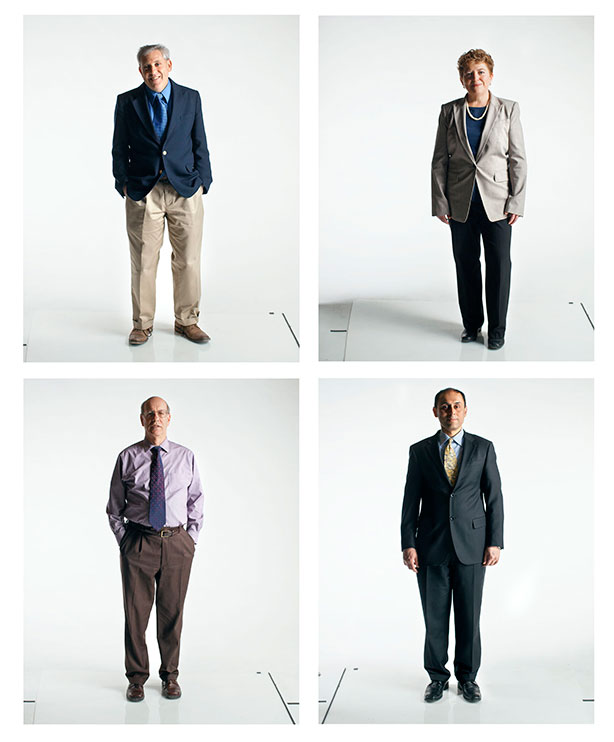
Cover image
Q&A with Cornell's deans: On money, misconceptions, hopes, strengths and where they see Cornell in 20 years
Beginning in this issue and continuing over the course of the next three issues, Ezra will share conversations with Cornell's academic leaders – the deans of the 15 university colleges
and schools. What are their hopes and dreams for the units they lead? What does it take to be dean? Where is Cornell headed?
With Cornell University's sesquicentennial anniversary in 2015 now visible on the horizon, this series will showcase the wisdom, aspirations and insight of the leaders of Cornell's schools in their own voices.
Appointed to five-year terms that can be renewed (most deans serve one or two terms), today's deans not only are academic superstars, teachers and researchers, but also must be chief financial officers, fundraisers and salespeople, mentors and referees. There may be no "typical" day or week in the life of a Cornell dean, but the men and women in these roles aren't typical, either – like Cornell, they are diverse and unique, and every single one of them is extremely accomplished. And, as you'll see in these pages, their personalities influence how they approach their jobs as much as the job requirements themselves.
Harry C. Katz
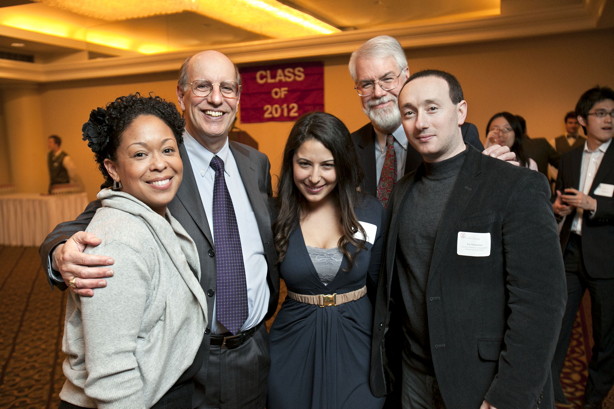
From left: Britt Gamble, ILR student services associate director; Dean Harry Katz; student Hilah Shenhav '12; economics professor George Boyer; and Ian Schachner, ILR associate director of admissions, at a May 2012 class council dinner.
What's the most surprising thing you've heard from a student or faculty member in the past year?
When Sam Nelson told me that Cornell's debate team, based at ILR, was ranked the No. 1 college debate team in the world for 2012.
What do you see 20 years in the future happening at ILR that will most affect students' experience?
I think we as a university are going to be doing more of what ILR is doing more of now: adult, continuous, life-long learning. It will be a bigger component of the teaching we do at ILR and at the university. Some of that, obviously, will be facilitated by technology, whether through MOOCs [massive open online courses], eCornell or other vehicles. Some of it may be in person, and some of it will be blended.
We've begun a master's degree program, an executive MPS degree, just approved by the trustees and the Faculty Senate, that's blended in the sense that part is face-to-face instruction – working adults coming to campus – with 35 percent of the content through eCornell courses that they take wherever.
What is one of your beliefs about your role as dean that proved to be untrue?
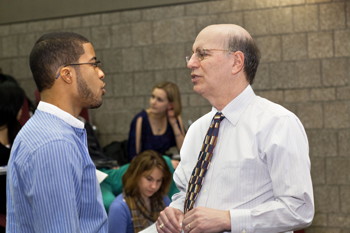
ILR Dean Harry Katz with student Thaddeus Talbot '15 during the Introduction to Collective Bargaining class that Katz teaches. See larger image
I thought that development was going to be the most painful part of my job. I thought that it was going to be embarrassing to have to ask people for money. But I learned that it was one of the more enjoyable, strategic and relational things. You have deep, long-standing relationships with people who have significant resources and are deciding where they want to invest their resources. It's finding a match between their interest and what we can do at ILR. That's very strategic and much more enjoyable than stopping someone on the street and saying, "Do you want to buy a chocolate bar or a ticket to our puppet show?"
Talk about the job. Is it true that it's up to you what your scope of influence on the college will be?
The job's a diverse portfolio of activities. Some of the things I do are very rudimentary: Somebody has to sign this form or somebody has to be there or give this welcome, and I do it. And I feel many people could do that as well as I.
But another part of what I do is to manage the college financially and strategically. And there I immerse myself in learning what the financial situation is. I work closely with my associate dean and staff, who help me analyze the finances of the college. I communicate with other deans, I talk with the provost. And there I steer. I'm the chief financial officer of the college. I inherited the wealth of the college, and I've tried to increase the wealth through development.
The other part of the job is that I'm the director of the academic strategic direction of the college. I am the senior person in authority, and so when I have the resources for a faculty hire because someone has retired or we've raised additional money, I decide where that position goes, which department, and within the department, what kind of person and what area we emphasize. I don't just decide this on my own; there's elaborate discussion, but the buck stops with me. There's nothing more important to the future of our college than who we're hiring.
I also continue to teach. It's helped keep me sane. I teach each spring a very large undergrad class. Every other year I teach a Ph.D. seminar, and every other year I also teach in our New York City master's program at our facility on 34th Street.
I've authored two eCornell courses. I also have a textbook, with two co-authors. I can proudly say it's the leading textbook in the field of collective bargaining. I am writing a new version of that, with a more international focus, as we speak.
What's the biggest obstacle to success for the ILR School now?
The lack of appreciation for the importance of human capital as a competitive advantage to organizations and society. Top executives, for example, often say, "People are our most important input," but they really don't believe it.
And because people matter, conflict management and conflict resolution matters, because it's essential to making use of people's talents. Conflict is ever-present. It's not pathological. It's a natural part of organizations. To maximize human potential, you need to get people to believe and practice that human potential matters, and to believe and to accept that there's going to be conflict along the way.
[Executives] don't pay enough attention to people and to conflict resolution. We could play a more significant role improving society if people were more open to those concepts.
What's most important to your identity apart from your job?
My family. I'm very attached to my wife and my children, my relatives.
What are you like at home?
I'm more of a loner type in private than in public. In public I'm outgoing; at home I'm quieter.
Even though I was born in New York City, I moved to California when I was 5 years old, and I moved back East when I finished my Ph.D. (at Berkeley) to Boston, to teach at MIT. My personality was very much shaped by the combination of East Coast and West Coast. So from the East Coast I got my sort of aggressive competitiveness; from West Coast I got my mellowness and sort of friendly easygoing side. In faculty meetings sometimes, members of the faculty will come up to me say, "Now I get it! The California side of you really came through. People were yelling and you just sat there!"
The DeanHarry C. Katz, the Kenneth F. Kahn Dean and Jack Sheinkman Professor At Cornell since 1985 Dean since July 2005 Area of expertise: Industrial relations and labor economics The ILR SchoolPopulation: 60 professors, 890 undergraduates, 160 graduate students Major areas of future growth: Increased internationalization of student curriculum; the learning experience, such as internships and service learning; and the offering of a new executive MPS degree Endowment: $75 million (as of June 2012) Cornell Now campaign goal/amount raised so far: $60 million/$24.8 million (as of March 2013) |
Kathryn Boor '80
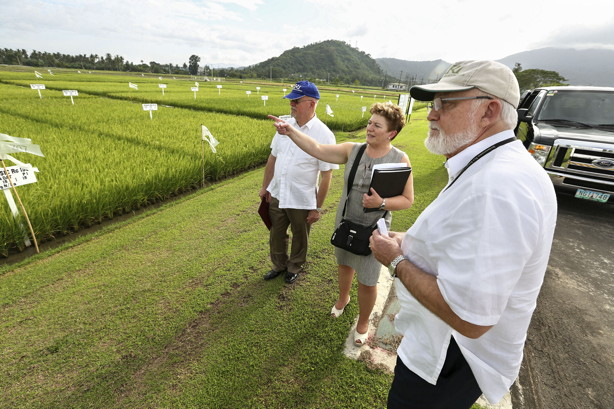
During a fall 2012 tour of Asia, Dean Kathryn Boor visited the International Rice Research Institute in the Philippines, hosted by IRRI Director General Robert Zeigler, Ph.D. '82, right, with Ronnie Coffman, Ph.D. '71, left, director of international programs for CALS.
What's the most surprising thing you've heard from a student or faculty member in the past 12 months?
There are surprises in many different categories every single day as a dean. I'd like to reflect on the most surprising thing I've learned recently in the context of new research findings by CALS scientists. I'm a microbiologist by training, and the area I'm tremendously interested in is the human-microbial interface. And so the most surprising thing I've heard recently was some research communicated to me by assistant professor Ruth Ley. Her group has found something absolutely astounding – that the microbes in a woman's GI tract, in her gut, actually change throughout pregnancy. And by the third trimester, these microbes influence the mother's metabolism so that she becomes more resistant to insulin and has a higher blood sugar content. What that does is help to feed and grow the baby. But it also simulates a condition that looks like "metabolic syndrome." The interactions between these microbes and the mother's metabolism are unexpected and very surprising.
What do you see in the near future for your college that will most significantly change experiences?
I see significant changes coming in at least three areas:
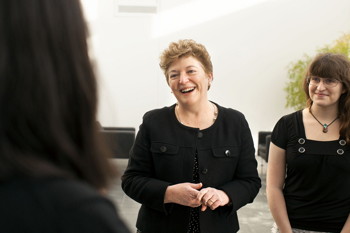
CALS Dean Kathryn Boor chats with students, including Kae-Lynn Wilson '13, early on a weekday morning. See larger image
Within 10 years, I predict we will see about a 50 percent turnover in our faculty, based simply on our faculty demographics and hiring patterns. We're in a period of massive faculty renewal … we will bring in many new faces in the next 10 years, at a much faster rate of hiring than we've seen in the past two decades.
I also believe we will start to see that students will be able to take many different pathways to earn credits toward a degree, possibly including the ability to transfer in credits from online courses. Regarding MOOCs, our goal is to be a quick follower in that category. It's one where being the leader is fraught with risk, but being a quick follower is a smart strategy. We will also see huge changes in the use of new instructional technologies right here on campus. And that will be really exciting!
Finally, our students are going to see vastly enhanced international opportunities – certainly 10 years from now, there will be more opportunities to work with faculty overseas and to participate in exchange programs with international partners.
What is one thing most people outside your college don't know about it?
Our college has undergone tremendous evolution over the past 10 or 20 years. We have much greater breadth of programming than I think anyone even here on campus realizes, if they're not in CALS.
We're a powerhouse in the environmental sciences. We have just launched a new major, environmental sciences and sustainability, and for the fall 2013 semester alone, we had more applications for this new major than we saw for the two majors we merged to build it. I think we've hit a sweet spot there.
And we have an incredibly powerful set of programs in the applied social sciences. In general, these programs fall in the sector we call "community and economic vitality." We have the Dyson School of Applied Economics and Management (ranked the No. 3 undergrad business program in the country by BusinessWeek); we have a communication program that's a powerhouse in social media and research; we have a very strong applied social science program as part of natural resources; we have landscape architecture; and we have development sociology. One typically doesn't find breadth and depth like this in a college of agriculture and life sciences.
What belief you had about your job as dean was proven wrong?
I had no idea the job was going to be so much fun. The opportunity to spend time with our incredible alumni, who have accomplished absolutely amazing things, is both inspiring and humbling. I feel similarly about the accomplishments of the faculty and students here on campus. In my first few months as dean, I literally poked in every single corner of the college and was absolutely awestruck by the myriad ways in which we focus our expertise every single day to address really important scientific and social questions. It is a great honor to partner with, and to serve, some of the world's brightest scientists and students.
What's the most profound thing you've learned from one of the other deans at Cornell?
Alan Mathios made this suggestion to me very early in my career: When dealing with an emotionally charged situation, which does happen in this role, he recommended consciously underreacting at first, until all facts are in hand. And that advice has been incredibly valuable! It's really effective – to distance oneself a bit from the emotion, be really conscious about the issues that are on the table.
What's the biggest obstacle to success for your college right now?
Our aging infrastructure. We have these beautiful old buildings and all of them are in need of loving care and attention, and that all means money. And on our Geneva campus [the New York State Agricultural Experiment Station], a lot of those buildings are, on average, 50-60 years old and in dire need of a facelift and more. Our Geneva campus contributes mightily to economic development for our upstate stakeholders. The facilities need to match our abilities and aspirations.
Who are you when you walk out the door of your office, or in the door at home?
My greatest secret pleasure is going to my laboratory here on campus, where I have talented and dedicated staff and students who are working to protect the safety of our food supply. When I walk out of this office and back into my own laboratory, I immerse myself again as a microbiologist.
The DeanKathryn Boor, the Ronald P. Lynch Dean of the College of Agriculture and Life Sciences At Cornell since 1994 Dean since July 2010 Area of expertise: Molecular microbiology focused on bacterial pathogenesis The College of Agriculture and Life SciencesPopulation: 360 faculty members, 3,503 undergraduates, 1,155 graduate students Major areas of future growth: Food and energy systems, the life sciences, the environmental sciences, and economic and community vitality Endowment: $339.3 million (as of February 2013) Cornell Now campaign goal/amount raised so far: $125 million/$82.1 million (as of March 2013) |
Alan Mathios
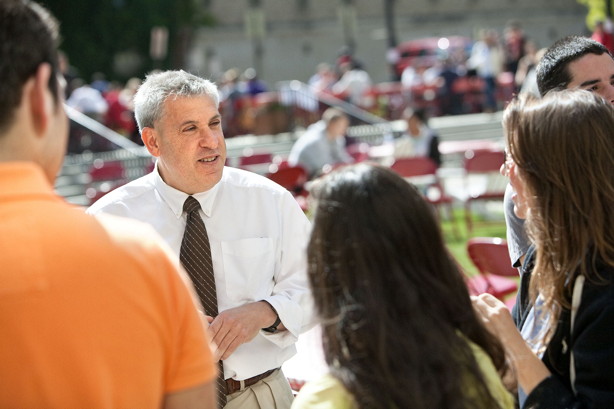
Alan Mathios, dean of the College of Human Ecology, chats with students as they make their way down the line at a college barbecue during a recent Commencement Weekend.
What do you predict happening in the near future that will be the most significant change for students?
Cornell has been experimenting with online tools for a long time, but I think massive open online courses, MOOCs, are fundamentally different and will change the way we deliver education in the residential environment. More and more, students will be looking at the same lecture material that's presented in online forums, but then the real education will come, in some sense, in the way we interact with that material in the classroom.
Also, as I see the college develop over the next decades, I see our students going into important fields, fields that I think are going to be key to the future, like our focus on health and well-being, nutrition, policies that focus on families. In 20 years, I think our alumni will be in a very influential set of occupations and will continue to help our students connect their learning to places beyond campus.
But, if you went back and asked graduates of 20 years ago if there'd be an MRI facility in this college, people would just shake their heads. We've always been interdisciplinary, but the world, and the [National Institutes of Health] explicitly, is just now catching up to this way of thinking. So it's not surprising that we're leading the Cornell Population Program, which includes 90 faculty from across the university. And there's the MRI facility and a new [developmental psychology] program with the Law School. Twenty years from now you're going to see even more of that multidisciplinary approach. The lines between colleges are going to fade. In 20 years, you won't be able to tell what's extension and what's research.
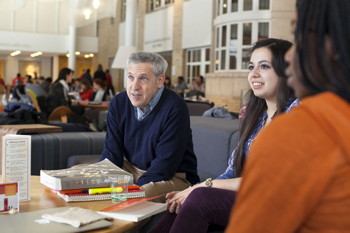
Human Ecology Dean Alan Mathios meets with students in the Human Ecology Commons. See larger image
What is one thing most people outside your college don't realize about it?
The scope of what goes on in the college. If you're looking in the windows of our new building, you'll see apparel studio sewing machines, and I think people associate that with our college and the history of our college. But right above that, on the first and second floors, are nanotechnology labs, anatomy labs, and almost every one of our rooms has a fume hood for bench science research.
The other thing that would surprise people is our externally sponsored research: It amounts to about $25 million per year, close to one-third of our revenue.
What was one initial belief you had about your role as dean that was proven completely wrong?
The surprise for me was the pure joy of the alumni affairs and development side of the job.
What percentage of your job is that?
The provost just asked me that. I told him about 30 to 35 percent.
I underestimated how much I'd miss the teaching, and I underestimated how much my connection to the alumni would make up for that. It's an incredible experience to see the dedication that they have to Cornell broadly and their connection to the college and how much they enjoy hearing what's going on. Their enthusiasm and input makes the work more fun than I expected.
What's the most profound thing you've learned from another dean? (You meet often, don't you?)
We meet every Tuesday for two hours, which is unique actually. When I was co-chairing the accreditation self-study for [the Middle States Commission on Higher Education] and we discussed how often deans meet, they were very impressed. Vice provosts and often the VPs are asked to attend. We have great discussions about virtually everything facing the university.
I think what I was most impressed with in these past few years was watching the confidence that Dan Huttenlocher had putting the [Cornell NYC Tech] campus proposal together, with Lance Collins. Watching the energy level they put forth, the quickness with which they were able to do it, the level of enthusiasm they had. I learned a lot about persistence. At times, the contest was really viewed as a shoo-in for Stanford. If you have the drive and the energy, you can do anything at Cornell. It was great to see it succeed.
What are your college's biggest challenges?
I think the budget challenges that face higher education.
Isn't every dean going to give that answer?
You know, sometimes I say, "The real scarcity is in great ideas."
I often say that first. But now we're awash in good ideas, and the challenge is going to be to pull them off. The cost of doing research has escalated. The start-up packages for labs, these are very significant college investments. If the NIH and the government cut back on investments in fundamental research at universities, all of Cornell is going to feel it.
The commitment to need-blind admission is so fundamental to Cornell that sustaining the fundraising for scholarships is going to be essential, too.
Earlier, I would have said that replacing the faculty is among the biggest challenges we face, because of the large number of retirements coming down the pike. But I'm so convinced that we are doing it successfully already that I'm not going to give that answer. In my first term, we hired 30 faculty members, so already one-third of the faculty are new. The quality of professors we've hired is phenomenal. I expect by the end of my second term, I will have replaced half the faculty of the college.
How do you define yourself, outside of your job as dean?
As a father and a husband. And I love to hike. My dream is to hike the Appalachian Trail. I've done a lot of parts of it, most of the Northeast area, in two-day snippets. And I like to read books outside my area – a lot of biographies.
The DeanAlan Mathios, the Rebecca Q. and James C. Morgan Dean of the College of Human Ecology At Cornell since 1992 Dean since July 2007 (interim dean until July 2008) Area of expertise: Impact of government regulation on consumer welfare The College of Human EcologyPopulation: 98 faculty members, 1,227 undergraduates, 291 graduate students Major areas of future growth: translational research, neuroscience, fashion and fiber innovation, public policy Endowment: $76.5 million (as of February 2013) Cornell Now campaign goal/amount raised to date: $30 million/$11.3 million (as of March 2013) |
Soumitra Dutta
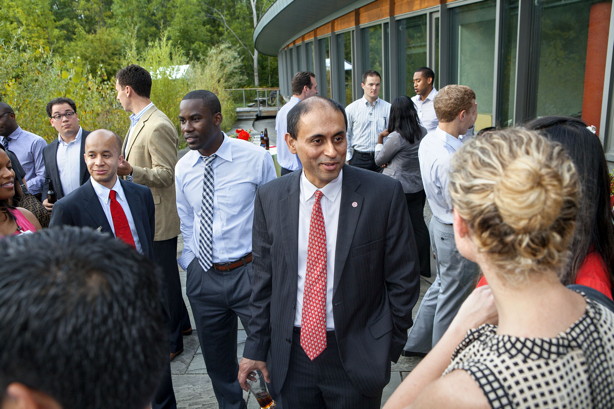
Johnson Dean Soumitra Dutta chats with returning MBA students at a September 2012 "welcome back" event held at Cornell's Lab of Ornithology.
What's the most surprising thing you've heard from a student or faculty member in the past six months?
When people hear that my wife and I moved from Paris to Ithaca, they usually say, "That must have been a tough move for you." But it was actually a very easy move. We were living in a very small town outside Paris called Fontainebleau, so in a sense we were used to a small-town environment in France also, and Ithaca is a beautiful place. In terms of living it's actually quite similar. The community in Ithaca has made the move easier, and the fact that we have Wegmans [supermarket] also made the food side much easier.
What significant change do you see in the near future for your college?
Johnson, as a business school, will have to work in a much more integrated fashion with other discipline-based schools in the university. On the big issues society is facing, be it energy, sustainability, climate, inequality, jobs or poverty, business is being asked to collaborate with government, the private sector, the public sector and civil society.
Cornell Tech is a very good example of this. Ultimately what the city wants is the creation of new jobs of a specific kind – technology-intensive, and technology-intense, educated people who are creating jobs. To do that, you need to integrate and work much more closely with engineering and computer science, and business schools will have to be much more proactive in that.
There are things we can do with Weill Cornell, with the College of Veterinary Medicine, with the Law School, with CALS, in agriculture and other areas. So lots of different possibilities exist – not just in engineering and computer science.
What is one thing most people don't know about your college?
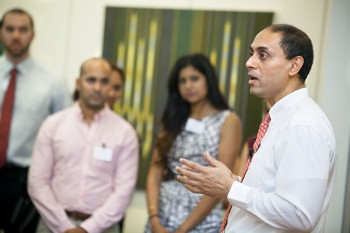
Johnson Dean Soumitra Dutta chats with returning MBA students at a September 2012 "welcome back" event held at Cornell's Lab of Ornithology. See larger image
How strong and how deep Cornell is in the field of business. Business education is delivered in four schools – the Dyson School, Johnson, the School of Hotel Administration and ILR – and also some in health management in Human Ecology, and in financial engineering and operations research in the College of Engineering.
If you look at the sum of these different parts, it places Cornell as one of the biggest top-tier business education universities in the United States. We are actually a major player in the world of universities in business education. That's a strength we have to project more aggressively, more smartly and leverage more for synergies.
What belief you had about your job as dean was proven wrong?
I expected that I would have the first three or four months to come in and just listen, observe and learn, and then formulate and describe my vision for the school. Because the creation of Cornell Tech was already happening, I quickly realized I did not have that luxury. So I had to move very fast to position Johnson as a core member of the Cornell Tech project. I arrived in late July, and by August I had held five workshops with faculty and staff to start discussing and building momentum inside the school around the Cornell Tech initiative. That made the first six months very intense, although we made a lot of good progress in a fairly short period of time: We have articulated the vision for the school, and we managed to get the key stakeholders and our alumni in line behind the vision.
What's the most profound thing you've learned from one of the other deans at Cornell?
I have to pace myself a little bit … and not try and do too many things at the same time. It's very important to balance my personal health and family life with the professional side, because the professional side can be all-consuming. These are big jobs and big opportunities, and they will take 100 percent of the time if you give 100 percent. And the challenge appears to be to balance it so that you don't damage your health or your personal life.
What's the biggest obstacle to success for your school right now?
Resources – our endowment is very small, only around $167.5 million. We have an ambition of being in the top 10, and most of the top 10 schools have endowments greater than $500 million, and a few of the leaders have endowments greater than $1 billion.
So we're really very under-resourced in terms of our endowment compared to our competitors, and that creates challenges of hiring faculty, giving scholarships to students, and just being able to do the kinds of things we need to do to establish and maintain our reputation as a top business school.
Who are you when you walk out the door of your office, or in the door at home?
I try to, of course, balance multiple roles, and the roles are me as a dean of this institution; me as a professor, as a researcher in my area of expertise; and me as a husband and family man at home. And it's a tough balance. Going forward, I have to try and make sure that I'm able to devote time adequately across the three roles. And when I leave the office, to some degree you never leave – because you have emails, and you have iPhones, and the office sort of follows you into the home. But I do try to make the time, make the effort to meet with friends socially with my wife, go on walks in Cayuga Heights, and enjoy some of the nature around. I like to paint and I haven't done any of that since I came to Ithaca, so I'd like to restart some of that.
The DeanName/title: Soumitra Dutta, the Anne and Elmer Lindseth Dean and professor of management At Cornell since July 2012 Dean since July 2012 Area of expertise: Innovation and technology strategy The Samuel Curtis Johnson Graduate School of ManagementPopulation: 95 faculty, 1,197 students Areas of future growth: Initiating a broadly conceived strategy for Johnson's presence in Cornell Tech to both grow activities and strengthen Ithaca-based programs Endowment: $167.5 million (as of June 2012) Cornell Now campaign goal/amount raised: $95 million/$58.3 million (as of March 2013) |